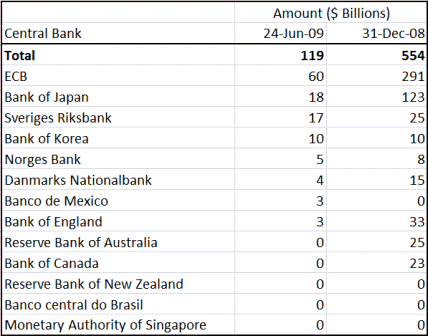[Skip to the end]
>
> (email exchange)
>
> On Tue, Jul 14, 2009 at 11:10 AM, wrote:
>
> Why do you think Germany is looking at issuing dollar bonds?
>
Good question!
They think the odds of the Fed bailing them out in a pinch are better than the ECB?
They have banks with dollar debt who need to repay the dollar swap line advances from the ECB?
The dollar interest rate is lower?
They are concerned about borrowing so many euro?
They want to bet the dollar will go down?
Some investment banker has talked them into believing there is some advantage to diversify their borrowings by currency?
None of these possible explanations make any sense so it must be something else.
By Anchalee Worrachate
July 10 (Bloomberg) — Germany is “closely monitoring†the dollar-denominated bond market for a possible sale, the head of the nation’s debt agency said.
“Dollar bonds are looking more attractive now from the issuer’s perspective than a couple of months ago,†Carl Heinz Daube, head of Germany’s Federal Finance Agency, said today in an interview from Frankfurt. “Nevertheless, there’s still no cost advantage for us at this point. If the price is right, we won’t say no.â€
Selling dollar bonds would allow Germany to appeal to a wider range of investors, including money managers in the U.S. who don’t want to take on foreign-exchange risk. The agency issued five-year dollar bonds in 2005, the only time it sold debt denominated in the U.S. currency.
A meeting with U.S. investors suggested there’s “strong†interest in the debt, Daube said.
“I met investors in the U.S. last week and a number of institutional investors seemed to be keen to invest in Germany’s dollar bonds,†he said. “The final decision is with the Ministry of Finance.â€
Germany hired banks to sell the five-year securities that come due in 2010 and may do so again should it proceed with a dollar-bond sale, Daube said on June 23.
“We tend to do less funding in the summer because of the holiday season,†Daube said. “But I might not say no if there’s a great cost advantage next week.â€
Record Sales
The German debt agency will sell an unprecedented 346 billion euros ($481 billion) of government securities this year, 157 billion euros of which are bonds, with the remaining 189 billion euros in shorter-dated money-market instruments.
Bank bailouts and economic stimulus packages are swelling budget deficits in some of Europe’s largest economies, forcing governments to compete for cash. Poland last week sold $2 billion of dollar bonds after getting about $8 billion of investor orders. Spain sold $1 billion of three-year securities in dollars in March. Greece said in April it may sell debt denominated in either Japanese yen or the U.S. currency during the latter half of the year.
“Governments are diversifying their issuance as there’s so much funding to be done,†said Harvinder Sian, a senior bond strategist at Royal Bank of Scotland Group Plc in London. “There’s a cost element that needs to be looked at. At the moment, it’s relatively attractive to issue dollar bonds.â€
The German government is looking at overall costs, including hedging fees against the dollar’s appreciation, before deciding whether to offer the bond, Daube said. The dollar rose more than 13 percent versus the euro in the past 12 months.
“We are not allowed to carry any currency risk,†he said. “The whole package will have to be good because we must be able to save taxpayers money to issue such bonds.â€
[top]


